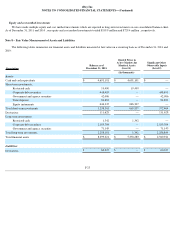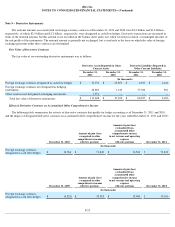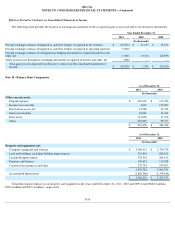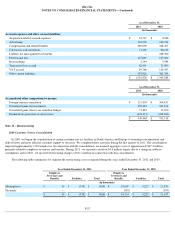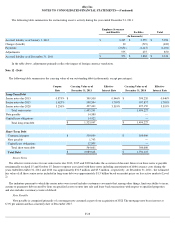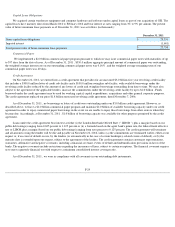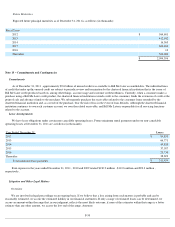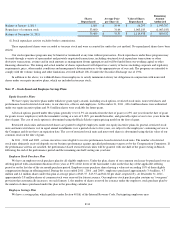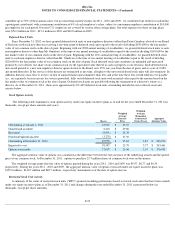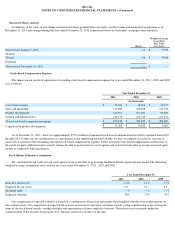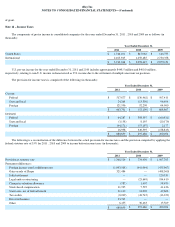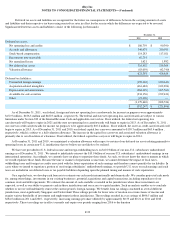eBay 2011 Annual Report Download - page 124
Download and view the complete annual report
Please find page 124 of the 2011 eBay annual report below. You can navigate through the pages in the report by either clicking on the pages listed below, or by using the keyword search tool below to find specific information within the annual report.
eBay Inc.
NOTES TO CONSOLIDATED FINANCIAL STATEMENTS—(Continued)
content, but that such injunctions must be proportionate and not block legitimate trade and (e) that trademark rights can only be evoked by a rights
owner as a result of a seller's commercial activity as opposed to private activity. The matter will now return to the U.K. High Court of Justice for
further action in light of the ECJ opinion. The case was originally filed in July 2007. L'Oréal's complaint alleged that we were jointly liable for
trademark infringement for the actions of the sellers who allegedly sold counterfeit goods, parallel imports and testers (not for resale products).
Additionally, L'Oréal claimed that eBay's use of L'Oréal brands on its website, in its search engine and in sponsored links, and purchase of L'Oréal
trademarks as keywords, constitute trademark infringement. The suit sought an injunction preventing future infringement, full disclosure of the
identity of all past and present sellers of infringing L'Oréal goods, and a declaration that our Verified Rights Owner (VeRO) program as then
operated was insufficient to prevent such infringement. The scope of a possible injunction claimed is to be specified after the trial upon remand
from the ECJ.
eBay's Korean subsidiary, IAC (which has merged into Gmarket and is now named eBay Korea), has notified its approximately 20 million
users of a January 2008 data breach involving personally identifiable information including name, address, resident registration number and some
transaction and refund data (but not including credit card information or real time banking information). Approximately 149,000 users have sued
IAC over this breach in several lawsuits in Korean courts and more may do so in the future. Trial for a group of four representative suits began in
August 2009 in the Seoul District Court, and trial for a group of 23 other suits began in September 2009 in the Seoul District Court. There is some
precedent in Korea for a court to grant “consolation money”
for data breaches without a specific finding of harm from the breach. Such precedents
have involved payments of up to approximately $200 per user. In January 2010, the Seoul District Court ruled that IAC had met its obligations
with respect to defending the site from intrusion and, accordingly, had no liability for the breach. This ruling has been appealed by approximately
34,000 plaintiffs to the Seoul High Court, where it is currently being heard de novo. A decision is expected in 2012.
General Matters
Other third parties have from time to time claimed, and others may claim in the future, that we have infringed their intellectual property
rights. We are subject to patent disputes, and expect that we will increasingly be subject to additional patent infringement claims involving various
aspects of our Marketplaces, Payments and GSI businesses as our services continue to expand in scope and complexity. Such claims may be
brought directly against our companies and/or against our customers (who may be entitled to contractual indemnification under their contracts
with us), and we are subject to increased exposure to such claims as a result of our recent acquisitions, particularly in cases where we are entering
into new businesses in connection with such acquisitions. We have in the past been forced to litigate such claims. We may also become more
vulnerable to third-party claims as laws such as the Digital Millennium Copyright Act, the Lanham Act and the Communications Decency Act are
interpreted by the courts, and as we expand the range and geographical scope of our services and become subject to laws in jurisdictions where the
underlying laws with respect to the potential liability of online intermediaries like ourselves are either unclear or less favorable. We believe that
additional lawsuits alleging that we have violated patent, copyright or trademark laws will be filed against us. Intellectual property claims, whether
meritorious or not, are time consuming and costly to defend and resolve, could require expensive changes in our methods of doing business, or
could require us to enter into costly royalty or licensing agreements on unfavorable terms.
From time to time, we are involved in other disputes or regulatory inquiries that arise in the ordinary course of business, including suits by
our users (individually or as class actions) alleging, among other things, improper disclosure of our prices, rules or policies, that our prices, rules,
policies or customer/user agreements violate applicable law, or that we have not acted in conformity with such prices, rules, policies or
agreements. The number and significance of these disputes and inquiries are increasing. Any claims or regulatory actions against us, whether
meritorious or not, could be time consuming, result in costly litigation, damage awards (including statutory damages for certain causes of action in
certain jurisdictions), injunctive relief or increased costs of doing business through adverse judgment or settlement, require us to change our
business practices in expensive ways, require significant amounts of management time, result in the diversion of significant operational resources
or otherwise harm our business.
Indemnification Provisions
In the ordinary course of business, we have included limited indemnification provisions in certain of our agreements with parties with which
we have commercial relations, including our standard marketing, promotions and application-programming-interface license agreements. Under
these contracts, we generally indemnify, hold harmless and agree to reimburse the indemnified party for losses suffered or incurred by the
indemnified party in connection with claims by a third party with respect to our domain names, trademarks, logos and other branding elements to
the extent that such marks are applicable to our
F-32



